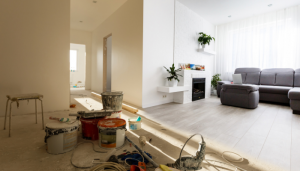
 Home renovations can be so transformational, fulfilling, and rewarding when done correctly. Whether you’re renovating the kitchen, redoing the bathroom, or upgrading the living room, a home makeover is an adventure. But like all adventures, there’s a great deal of things that could go wrong. Many homeowners often dive straight into the process with no idea of what to expect. It’s only after they suffer the repercussions of a failed project that they regret not having a plan.
From wrong materials and unforeseen delays to hidden expenses, renovating your home can turn into the most stressful event of your life. If you’re not completely prepared for your renovation project, you will end up becoming overwhelmed by the number of mishaps that could suddenly pop up. Renovations are not as simple as they depict on TV shows. The reality is that it requires a lot of energy, time, and money. If you want to get it right the first time, you need to consider and prepare before starting the project.
Home renovations can be so transformational, fulfilling, and rewarding when done correctly. Whether you’re renovating the kitchen, redoing the bathroom, or upgrading the living room, a home makeover is an adventure. But like all adventures, there’s a great deal of things that could go wrong. Many homeowners often dive straight into the process with no idea of what to expect. It’s only after they suffer the repercussions of a failed project that they regret not having a plan.
From wrong materials and unforeseen delays to hidden expenses, renovating your home can turn into the most stressful event of your life. If you’re not completely prepared for your renovation project, you will end up becoming overwhelmed by the number of mishaps that could suddenly pop up. Renovations are not as simple as they depict on TV shows. The reality is that it requires a lot of energy, time, and money. If you want to get it right the first time, you need to consider and prepare before starting the project.
1. Map out your plan

 Unlike building a new house, renovating a home is more complicated since you’re not starting with a blank canvas. Let’s take a look at it this way. Imagine you’re upgrading your bathroom and adding a new bathtub. As you try to install it, you suddenly realize you overestimated the square footage of your bathroom. Not only is the toilet too close to your new tub, but there’s not enough room for you to comfortably move.
That is why it’s crucial to plan everything out before you start a renovation project. Without a realistic and detailed plan, you could end up with a lot on your plate. There’s a chance you might even forget what your original goal was. You need to know what you want and put it all on paper. It might be easy to say you want a new bathroom. But what does this mean?
Try to create a detailed design direction and make a plan of action. Narrow down what you want in your renovation project. Do you only need a new mirror, countertop, or bathtub? Does it involve structural changes like reconfiguring the space, knocking down walls, or moving wires and plumbing fixtures? What task do you need to do first? You need to figure out all the details and not just the big picture.
Unlike building a new house, renovating a home is more complicated since you’re not starting with a blank canvas. Let’s take a look at it this way. Imagine you’re upgrading your bathroom and adding a new bathtub. As you try to install it, you suddenly realize you overestimated the square footage of your bathroom. Not only is the toilet too close to your new tub, but there’s not enough room for you to comfortably move.
That is why it’s crucial to plan everything out before you start a renovation project. Without a realistic and detailed plan, you could end up with a lot on your plate. There’s a chance you might even forget what your original goal was. You need to know what you want and put it all on paper. It might be easy to say you want a new bathroom. But what does this mean?
Try to create a detailed design direction and make a plan of action. Narrow down what you want in your renovation project. Do you only need a new mirror, countertop, or bathtub? Does it involve structural changes like reconfiguring the space, knocking down walls, or moving wires and plumbing fixtures? What task do you need to do first? You need to figure out all the details and not just the big picture.
2. Set a budget

 Once you’re clear about what you want, it’s time to set the budget. Before you get too attached to that photo of a modern kitchen you found on Pinterest, try to run the numbers. A good way of getting an estimate on how much your project may cost is by taking a stroll down the aisles of your local hardware stores or design centers. Do as much window shopping as you can, and compare the prices for all the materials you need.
If that seems like too much work for you, you can get quotes from suppliers and architects. Most builders are willing to visit a site and provide a free quotation. You can expect to pay around 50 percent of the material cost, 30 percent for labor, and 20 percent for tax. Consider talking to at least three contractors, then start comparing bids. You need to know whether you are biting off more than you can chew.
While figuring out your budget, you should also consider a contingency surplus you can depend on when you have setbacks. Your renovation project may face some unanticipated mishaps along the way, like burst pipes or blown circuits. This is something that most people often forget. While having a strict budget is vital, you should also leave room for unexpected costs. Set aside a little extra money so that you won’t have to panic when things suddenly don’t go as planned.
Once you’re clear about what you want, it’s time to set the budget. Before you get too attached to that photo of a modern kitchen you found on Pinterest, try to run the numbers. A good way of getting an estimate on how much your project may cost is by taking a stroll down the aisles of your local hardware stores or design centers. Do as much window shopping as you can, and compare the prices for all the materials you need.
If that seems like too much work for you, you can get quotes from suppliers and architects. Most builders are willing to visit a site and provide a free quotation. You can expect to pay around 50 percent of the material cost, 30 percent for labor, and 20 percent for tax. Consider talking to at least three contractors, then start comparing bids. You need to know whether you are biting off more than you can chew.
While figuring out your budget, you should also consider a contingency surplus you can depend on when you have setbacks. Your renovation project may face some unanticipated mishaps along the way, like burst pipes or blown circuits. This is something that most people often forget. While having a strict budget is vital, you should also leave room for unexpected costs. Set aside a little extra money so that you won’t have to panic when things suddenly don’t go as planned.
3. Figure out a realistic timeframe

 Before starting your renovation project, create a schedule that lists what task needs to be done and in what order. Since home makeovers involve hard work and long hours, most people often quickly lose their steam. With all the work that needs to be done, the renovation process can be chaotic. It’s easy to forget about what you’re supposed to do, especially if you’re renovating several rooms. By having a schedule in place, you can work at a steady phase and keep your focus until the project is completed.
But one thing that you need to know about renovation projects is that they often take longer than expected. Between unfavorable weather conditions, late delivery of materials, and subcontractors getting sick, various things could delay the project. Your expectation of using that new tub within a week can turn into a seven-week waiting period.
You need to be realistic when you’re figuring out a timeline. Think about how long you’re willing to use a temporary bathroom. Check your calendar and see if there are upcoming events that require your full attention. Are you scheduled for an open house next month? Do you need the renovations finished in four weeks or can it be stretched for another two weeks?
Before starting your renovation project, create a schedule that lists what task needs to be done and in what order. Since home makeovers involve hard work and long hours, most people often quickly lose their steam. With all the work that needs to be done, the renovation process can be chaotic. It’s easy to forget about what you’re supposed to do, especially if you’re renovating several rooms. By having a schedule in place, you can work at a steady phase and keep your focus until the project is completed.
But one thing that you need to know about renovation projects is that they often take longer than expected. Between unfavorable weather conditions, late delivery of materials, and subcontractors getting sick, various things could delay the project. Your expectation of using that new tub within a week can turn into a seven-week waiting period.
You need to be realistic when you’re figuring out a timeline. Think about how long you’re willing to use a temporary bathroom. Check your calendar and see if there are upcoming events that require your full attention. Are you scheduled for an open house next month? Do you need the renovations finished in four weeks or can it be stretched for another two weeks?
4. Consider if you need any permits

 Before renovating your home, keep in mind that certain types of upgrades require city government permits. Today’s buyers and lenders check whether homes or commercial spaces complied with building codes and regulations. Without these documents, you might encounter difficulties if you plan on selling or refinancing your home.
The National Building Code of the Philippines requires a person or firm to obtain a building permit for all renovation projects, except cosmetic interior upgrades. As part of the Building Permit process, an official will check and assess the renovation plans you submitted to guarantee if it complies with the National Building Code of the Philippines (PD 1096), Fire Code of the Philippines (RA 9514), and your Local Building Code.
Securing this permit ensures that the homeowner or contractor working on the renovation follows the codes, standards, and minimum requirements for construction. Failure to comply with this code would constitute a violation of PD 1096. The punishment entails a fine of not more than twenty thousand pesos, imprisonment of up to two years, or both.
Before renovating your home, keep in mind that certain types of upgrades require city government permits. Today’s buyers and lenders check whether homes or commercial spaces complied with building codes and regulations. Without these documents, you might encounter difficulties if you plan on selling or refinancing your home.
The National Building Code of the Philippines requires a person or firm to obtain a building permit for all renovation projects, except cosmetic interior upgrades. As part of the Building Permit process, an official will check and assess the renovation plans you submitted to guarantee if it complies with the National Building Code of the Philippines (PD 1096), Fire Code of the Philippines (RA 9514), and your Local Building Code.
Securing this permit ensures that the homeowner or contractor working on the renovation follows the codes, standards, and minimum requirements for construction. Failure to comply with this code would constitute a violation of PD 1096. The punishment entails a fine of not more than twenty thousand pesos, imprisonment of up to two years, or both.
5. Decide whether you want to DIY or call in the experts

 Some renovation projects are easy enough that a homeowner with little construction skill can do it. Simple cosmetic home improvements, such as adding a fresh coat of paint or updating light fixtures, can be done without an expert’s help. Sure, you can benefit from their expertise, but there’s no harm in doing it yourself. Instead of paying for their labor, you can channel your renovation budget to bigger tasks, like buying quality materials.
Of course, you should be realistic about the skills you have and the jobs you can do alone. Home renovations that involve taking down walls or moving wires can be dangerous. If you don’t know how to tackle a certain task or feel confident in doing it, it’s better to find the right people that can handle the job. Otherwise, you could create more problems that could potentially cost you more money.
You should also consider how much free time you have. No one wants to sleep on the small couch for one month just because their bedroom is still all torn up. Hiring professional contractors can go a long way in easing the renovation process. Not only do they have the correct equipment and adequate knowledge to get the job done right, but they can finish it in no time.
Some renovation projects are easy enough that a homeowner with little construction skill can do it. Simple cosmetic home improvements, such as adding a fresh coat of paint or updating light fixtures, can be done without an expert’s help. Sure, you can benefit from their expertise, but there’s no harm in doing it yourself. Instead of paying for their labor, you can channel your renovation budget to bigger tasks, like buying quality materials.
Of course, you should be realistic about the skills you have and the jobs you can do alone. Home renovations that involve taking down walls or moving wires can be dangerous. If you don’t know how to tackle a certain task or feel confident in doing it, it’s better to find the right people that can handle the job. Otherwise, you could create more problems that could potentially cost you more money.
You should also consider how much free time you have. No one wants to sleep on the small couch for one month just because their bedroom is still all torn up. Hiring professional contractors can go a long way in easing the renovation process. Not only do they have the correct equipment and adequate knowledge to get the job done right, but they can finish it in no time.
6. Insist on an airtight contract

 Starting a renovation project is fun, but things start to get complicated and less dreamy as it goes on. If you decide to work with a professional builder, it’s in your best interest to push for an airtight contract. Even if you hire a contractor, accidents and issues beyond a human’s control can still happen. That is why your contract needs to be specific and includes the following:
Starting a renovation project is fun, but things start to get complicated and less dreamy as it goes on. If you decide to work with a professional builder, it’s in your best interest to push for an airtight contract. Even if you hire a contractor, accidents and issues beyond a human’s control can still happen. That is why your contract needs to be specific and includes the following:
- Payment schedule
- Timeframe
- Potential penalties if the contractor fails to meet the deadline
- Details on all the work
7. Think about layout functionality

 The functionality of the room is another thing that you need to consider. Most people fail to comprehend that the layout is as vital as the aesthetic appeal of the space. You have probably seen pictures on the internet that shows a kitchen with hardly any room for you to comfortably move around.
Because of the bulky appliances and poor spacing, the room will leave you feeling clutter and claustrophobic. Before you approve the floor plan, consider the square footage of the room and the layout of the remodel.
Try to imagine what the room will look like if you are using all the drawers and appliances at the same time. Will opening your fridge door prevent you from using the stove? Will adding a kitchen island prevent you from moving comfortably around the room?
The functionality of the room is another thing that you need to consider. Most people fail to comprehend that the layout is as vital as the aesthetic appeal of the space. You have probably seen pictures on the internet that shows a kitchen with hardly any room for you to comfortably move around.
Because of the bulky appliances and poor spacing, the room will leave you feeling clutter and claustrophobic. Before you approve the floor plan, consider the square footage of the room and the layout of the remodel.
Try to imagine what the room will look like if you are using all the drawers and appliances at the same time. Will opening your fridge door prevent you from using the stove? Will adding a kitchen island prevent you from moving comfortably around the room?
8. Maximize existing spaces

 If you’re planning on selling your home, keep in mind that storage space is one of the features that home hunters want. Houses located in small plots will benefit greatly from renovation projects that maximize existing space. By reworking spaces and reorienting a layout, you can increase aesthetic appeal, create a dual-use for a single room, and ensure no space is wasted.
There are many innovative strategies that you can follow. If you can’t build any wider, then try maximizing your vertical space. For example, you can move the bathroom cabinets to head level, so you can have more leg space to move around. Those living in cramped spaces can make use of smart cabinets to store all their items neatly.
If you’re planning on selling your home, keep in mind that storage space is one of the features that home hunters want. Houses located in small plots will benefit greatly from renovation projects that maximize existing space. By reworking spaces and reorienting a layout, you can increase aesthetic appeal, create a dual-use for a single room, and ensure no space is wasted.
There are many innovative strategies that you can follow. If you can’t build any wider, then try maximizing your vertical space. For example, you can move the bathroom cabinets to head level, so you can have more leg space to move around. Those living in cramped spaces can make use of smart cabinets to store all their items neatly.
9. Test run your colors and materials

 If you’re planning on working on the interior design yourself, you need to think about it thoroughly before you start buying the materials. Try to create a mood board of images, colors, and textures. You can visit showrooms and collect samples to test run the colors and materials.
Keep in mind that color and pattern changes with the light throughout the day. If you have enough samples, try to paint a small streak on a board or sturdy cardboard and move it around the rooms throughout the day and into the night.
If you’re planning on working on the interior design yourself, you need to think about it thoroughly before you start buying the materials. Try to create a mood board of images, colors, and textures. You can visit showrooms and collect samples to test run the colors and materials.
Keep in mind that color and pattern changes with the light throughout the day. If you have enough samples, try to paint a small streak on a board or sturdy cardboard and move it around the rooms throughout the day and into the night.
10. Accommodations and lifestyle changes

 One of the most important things that many homeowners fail to consider is how a renovation project affects their daily life. Not only does this disrupt your daily activities, but it can also cause a massive impact on your lifestyle and mental health.
Depending on how large the renovation project is, you might need to consider how you’re going to live in your home while the work is being carried out. The constant traffic and noise in the halls might be too loud and stressful for you to handle.
If you think you can’t live in that kind of environment for more than a few days, you might need to make some alternative living arrangements. You might need to rent a house for a few months or move in with your parents if you don’t have enough budget. If you plan on staying home during the renovation project, you should also think about how you’ll be able to bathe, cook, and sleep.
One of the most important things that many homeowners fail to consider is how a renovation project affects their daily life. Not only does this disrupt your daily activities, but it can also cause a massive impact on your lifestyle and mental health.
Depending on how large the renovation project is, you might need to consider how you’re going to live in your home while the work is being carried out. The constant traffic and noise in the halls might be too loud and stressful for you to handle.
If you think you can’t live in that kind of environment for more than a few days, you might need to make some alternative living arrangements. You might need to rent a house for a few months or move in with your parents if you don’t have enough budget. If you plan on staying home during the renovation project, you should also think about how you’ll be able to bathe, cook, and sleep.
Takeaway
A home renovation is a big decision that many homeowners face at least once in their lives. Whether it’s to add value to your home or improve the quality of your life, it can be a very rewarding event. However, renovation projects can also turn into your most expensive mistake. But with proper preparations and considerations, you can minimize and even eliminate any potential issues. There are many ways you can make sure that the renovation process doesn’t get out of hand. Even a simple forethought can make a difference in ensuring everything goes smoothly. At the end of the day, all your planning will result in a home that feels just right for you and your loved ones.Like What you've read?
If so, please join our newsletter and receive exclusive weekly home buying tips, financing guides and Philippine real estate news. Enter your email and click Send Me Free Updates










